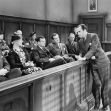There is no question that COVID-19 has posed countless problems for the legal system. But one defendant, convicted of multiple murders in California, tried to blame COVID for his convictions. He argued that forcing his jury to deliberate during the pandemic deprived him of due process. The appellate court was not persuaded by his unique contention.
Kori Muhammad, a “Black Supremacist,” murdered four people during a 2017 shooting spree in Fresno. The complaint originally charged him with first-degree murder, which could have subjected him to the death penalty if convicted. Muhammad’s attorney conceded that his client committed the crimes, but claimed that his behavior was caused by paranoid schizophrenia. During the trial, the defendant had testified that he believed that “shooting white people was part of his divine, preordained mission to establish a kingdom of infinite peace and promise.”
The 31-day trial took place over February, March, and April of 2020, as a result of the State’s closure of courtrooms because of COVID. At the end of the trial, the defendant was sentenced to 61 years in prison plus an additional term that could range from 145 years to life.
After being sentenced, Muhammad appealed, arguing that the trial court “deprived him of due process by coercing the jury to deliberate during the COVID pandemic.” A unanimous three-judge panel of Division Six of California’s Second District Court of Appeal affirmed the ruling of Fresno Superior Court Judge Jonathan B. Conklin, and ruled on February 22 that “there was no jury coercion here.” Justice Kenneth Yegan authored the opinion with concurrences by Presiding Justice Arthur Gilbert and Justice Hernaldo J. Baltodano.
Appellant’s entire trial took place during the pandemic. Jurors were seated with social distancing and asked to isolate themselves as much as possible at home and in the court. The defense rested on March 17, and final arguments were scheduled for two days later. After the first day, jurors were given a questionnaire about their willingness to continue. All of them said yes, but their preference was not possible after the State closed all courtrooms due to COVID.
The trial resumed one month later, on April 20. When jurors returned, they requested that testimony from five witnesses be read back to them. They also submitted three questions to the trial judge about the verdict forms. Muhammad had been charged with one count of first-degree murder, three counts of second-degree murder, four counts of attempted murder, one count of shooting at an occupied vehicle, and one count of being a felon in possession of a firearm. After reviewing their questions about the multiple counts, Judge Conklin instructed the jurors to consider each count separately.
On April 20, jurors told the bailiff they were able to agree on some counts but not others. The judge asked which counts were decided and which were not. One hour later, all jurors agreed on all counts, but when the verdicts were read in court, one juror objected to the verdict description that was given to the trial judge. Jurors were returned to the jury room for further deliberations. After a new agreement was reached, the defendant withdrew his plea of not guilty by reason of insanity and the prosecutors withdrew their request for the death penalty.
Muhammad’s appeal rests on his belief that the trial court “deprived him of due process by ‘insisting’ that deliberations continue during the first COVID outbreak.” He said that Conklin “failed to consider how the jurors’ anxiety” may have interfered with their ability to deliberate. He also argued that COVID might have justified the complete release of the jurors from their duty. In addition, he charged that the court’s “hard deadline” of April 30 did not give them enough time to decide the case due to the “intense pressure” they were under. He said that this pressure amounted to jury “coercion.”
The Court of Appeal justices unanimously disagreed with all of the defendant’s contentions. They did not find a valid precedent, and they explained that any jury problems were resolved quickly. “We are not persuaded the trial court coerced jurors by holding an immutable deadline over their heads,” Yegan wrote. He said that the trial judge did not place the need for a conclusion over the health and well-being of the jurors. When they reconvened after mandatory closures, the judge told them to take their time and not feel rushed.
While appellant called the trial proceedings a “shambles” that went “off the rails” due to pressure from the judge, the opinion said that all jury issues were resolved promptly and in line with other cases of comparable complexity.
In conclusion, while confirming the verdict the opinion said, “With considerable and thoughtful regard for the jurors’ well-being during the COVID pandemic, the trial court did the best job it could. We cannot conceive of any further efforts the trial court could have undertaken.” Yegan went so far as to say, “We commend it for handing this serious proceeding at a serious time.”
COVID clearly upset normal court operations. But, at least in this murder case, the pandemic can’t be blamed for the jury’s verdict.






